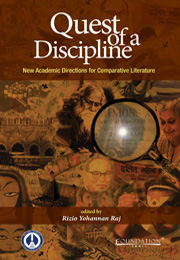Book contents
- Frontmatter
- Contents
- List of Contributors
- Acknowledgements
- Prologue to the “Quest'
- Introduction
- PART I Traditions and Manifestoes: Reflecting on Perspectives
- PART II The Quest Motif: Redefining the Scope of Comparative Literature
- PART III The Dynamics of Exchange: Genres, Areas and Disciplines
- PART IV India: A Curious Comparative Space
- 15 Towards a Compoetics in India: Alternative Frameworks for the Comparative Study of Poetics
- 16 The Relevance of Dalit Studies in the Creation of an Interdiscipline
- 17 Mother Tongue, The Other Tongue: Indianising English
- Afterword: Comparative? Literature?
- Index
17 - Mother Tongue, The Other Tongue: Indianising English
from PART IV - India: A Curious Comparative Space
Published online by Cambridge University Press: 05 June 2012
- Frontmatter
- Contents
- List of Contributors
- Acknowledgements
- Prologue to the “Quest'
- Introduction
- PART I Traditions and Manifestoes: Reflecting on Perspectives
- PART II The Quest Motif: Redefining the Scope of Comparative Literature
- PART III The Dynamics of Exchange: Genres, Areas and Disciplines
- PART IV India: A Curious Comparative Space
- 15 Towards a Compoetics in India: Alternative Frameworks for the Comparative Study of Poetics
- 16 The Relevance of Dalit Studies in the Creation of an Interdiscipline
- 17 Mother Tongue, The Other Tongue: Indianising English
- Afterword: Comparative? Literature?
- Index
Summary
INTRODUCTION
Poacher! Pirate! We reject your authority. We know you, with your foreign language wrapped around you like a flag: speaking about us in your forked tongue, what can you tell but lies?
Salman Rushdie, ShameIt is wrong to pit English writing against the whole regional writing; how can we compare a part with the whole? How can you put a literature that is over a thousand years old against one that is scarcely hundred years old and only finding its true voice?…There is a failure of criticism to put this writing where it belongs, in its right context, relating it instead to literature with which it has nothing in common except the language.
Shashi Deshpande, from an article in The Hindu…Why not let me speak in
Any language I like? The language I speak
Becomes mine, its distortions, its queernesses
All mine, mine alone. It is half-English, half
Indian, funny perhaps, but it is honest,
It is as human as I am human, don't
You see?…
Kamala Das, ‘An Introduction’The discipline of Comparative Literature has often been wrongly conceived merely as comparison of texts and authors from different languages, cultures and regions. This most often fruitless exercise has gone on for decades in the name of research in Comparative Literature too.
- Type
- Chapter
- Information
- Quest of a DisciplineNew Academic Directions for Comparative Literature, pp. 257 - 279Publisher: Foundation BooksPrint publication year: 2012
- 1
- Cited by



